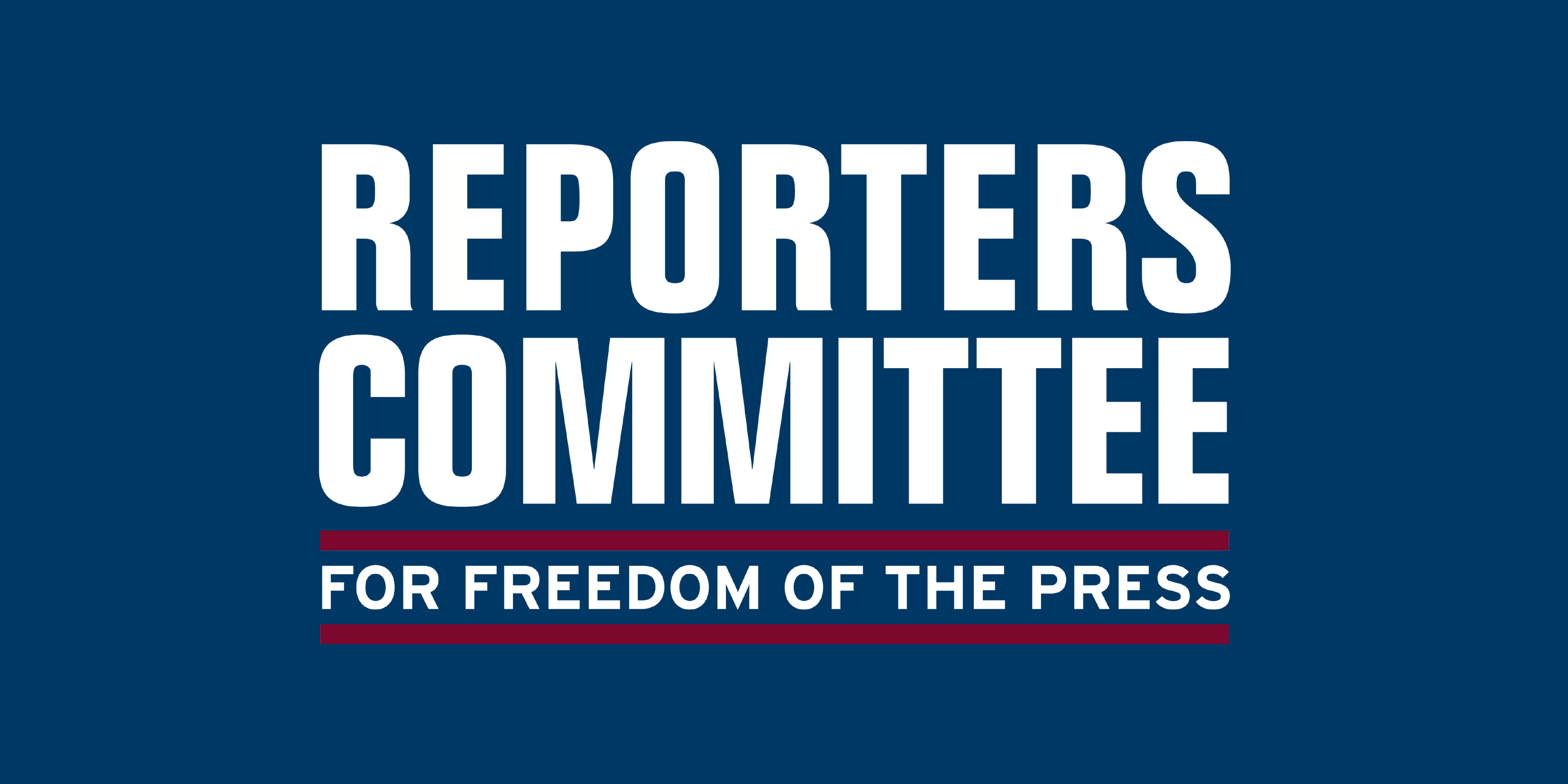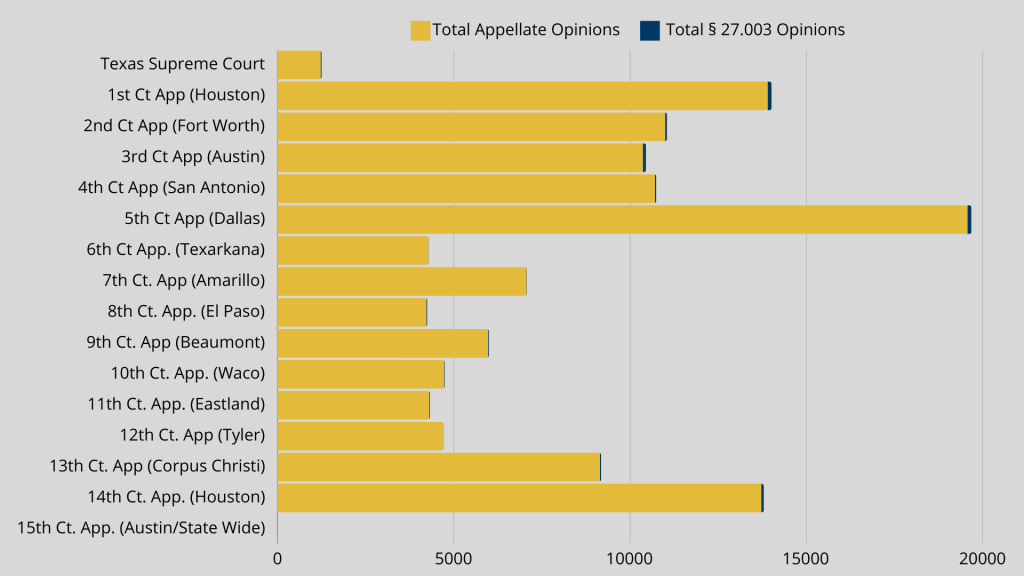Texas anti-SLAPP cases make up small percentage of state’s appellate workload

Read Part 2 of our special analysis series about the Texas Citizens Participation Act, which explores who benefits most from the law.
Since its passage in 2011, Texas residents have benefited from a strong state law deterring strategic lawsuits against public participation. SLAPPs are frivolous lawsuits, often alleging defamation, that are intended to intimidate defendants into silence. The state’s anti-SLAPP law, the Texas Citizens Participation Act, or TCPA, permits SLAPP defendants to quickly dismiss such lawsuits before the expense of a full trial.
Opponents of the law, however, have claimed that litigating TCPA motions has burdened state appeals courts. For instance, in testimony before the Texas House of Representatives Committee on the Judiciary and Civil Jurisprudence, a witness said that “at one time” the Texas Court of Appeals for the Fifth District in Dallas “reported to us that 40% of their docket was TCPA cases.”[1]
Relying on data provided by the Texas Judiciary and Westlaw, the Reporters Committee for Freedom of the Press sought to quantitatively analyze the number of TCPA cases considered by the Texas courts of appeal and Supreme Court, and the numbers are relatively small.
For instance, in the Dallas appeals court from 2011 through 2023, the total number of published opinions referencing the TCPA is 110, slightly more than half-a-percent (0.56 percent) of the 19,570 opinions issued by that court during this stretch. The Dallas court issued 22 TCPA opinions in 2019, the most by that court in any given year, yet this still only accounted for 1.43 percent of that court’s 1,534 opinions produced that year.
In fact, the total number of TCPA cases in all 14 Texas appeals courts and the Texas Supreme Court is roughly half-a-percent (0.50 percent) of all the appellate opinions issued by those courts during that 13-year span.
To calculate these numbers, we did two things.
First, to determine the denominator, the total number of appellate and Supreme Court decisions, we took a conservative approach. We relied on the Texas Judicial Branch’s Fiscal Year Annual Reports, Annual Statistical Supplement, for each year from 2011 through 2023. The state’s fiscal year runs from Sept. 1 through Aug. 31.
For the appeals courts, we then included only original opinions on the merits, opinions dismissing appeals, and per curiam opinions.[2] For the Texas Supreme Court, we included majority opinions and per curiam opinions for each year.[3]
That gave us a total of 124,921 appellate and Supreme Court opinions from 2011 to 2023, the last fiscal year with data available from the Texas Judicial Branch.
The state datasets do not break down opinions by issues or statutes being considered. To get that number, the numerator, we relied on Westlaw searches.
Specifically, we used Section 27.003 of the Texas Civil Practices and Remedies Code. Section 27.003 is the TCPA provision that provides SLAPP defendants the ability to file an early motion to dismiss claims based on a defendant’s exercise of the constitutionally protected rights of free speech, assembly, or association. In other words, it’s the real “meat” of the TCPA.
We searched for all cases in the Texas appeals courts and the Supreme Court citing that provision. We then performed a quality-control review of those results to ensure that they addressed TCPA motions on the merits and weren’t just citing the section of the statute for irrelevant reasons.
We then compiled all of this data in a master spreadsheet, calculating the percentage of total Section 27.003 cases across each fiscal year from 2011 through 2023, for each court, as well as the total of all cases across that time span for all courts.
The results clearly show that, even taking a conservative approach, the total number of TCPA cases in Texas courts is small.

For the 13 fiscal years from passage of the TCPA in 2011 through 2023, the appellate courts and the Supreme Court issued about 125,000 opinions, including only about 630 opinions citing Section 27.003. The Texas Supreme Court had a higher incidence of TCPA cases — but not by much. From 2011 through 2023, the state’s highest court issued 1,229 opinions, just 23 of which, or 1.87 percent, cited the motion-to-dismiss provision in the TCPA.
Here are several other highlights of our analysis:
- Fiscal Year 2020 proved the “busiest” year for TCPA litigation in the Courts of Appeals, showing up in 133 (1.59 percent) of the 8,379 opinions issued across all 14 appellate districts. (Note that the Texas legislature amended the law in 2019, which went into effect at the start of fiscal year 2020.[4])
- Fiscal Year 2022 was the first year in which all appellate districts and the Supreme Court issued at least one opinion involving the TCPA, with the statute appearing in just 68 of the 7,799 total appellate opinions (0.87 percent) published that year.
- Of all the Courts of Appeals, the Third District in Austin saw the highest percentage (0.84 percent) of overall TCPA cases from 2011 through 2023, but even there these matters accounted for just 87 of the 10,365 total opinions issued by that court in this timespan.
- Austin’s Third District in 2020 saw the highest percentage of TCPA opinions for any appellate district in any year, issuing 25 of its 753 opinions (3.32 percent) citing section 27.003; however, Houston’s First District technically issued more TCPA-related opinions (26 of 927 total opinions, or 2.80 percent) that same year.
- In 2019, the Supreme Court saw its highest frequency of TCPA opinions, at 5.81 percent (5 of 86 total opinions). This number immediately declined thereafter, with the Court publishing just three TCPA opinions in 2020 and 2021, respectively, one in 2022, and two in 2023.
It is true that the courts saw an uptick in TCPA cases from 2019 to 2023, relative to the previous years. But even then, there were only 468 Section 27.003 opinions out of a total of 42,615 opinions (1.10 percent) across all appellate courts and the Texas Supreme Court in those five years.
Finally, we looked briefly at the incidence of cases involving another Texas law that has been supported by critics of the TCPA. Section 74.351 of the Texas Civil Practice and Remedies Code governs use of expert testimony and reports in medical malpractice litigation. During the period from 2011 through 2023, that section appeared in 1,040, or 0.83 percent, of Texas appellate or Supreme Court cases. The Texas Supreme Court issued 53 opinions citing that statute, versus 23 involving the TCPA.
In sum, in addition to being an essential protection for the news media and public in the Lone Star State, the TCPA represents a relatively small number of cases before the Texas appellate courts and Supreme Court. That has been the case since its passage in 2011.
Footnotes
- See Oct. 2, 2024 Hearing of Texas House of Reps., Comm. On Judiciary & Civil Jurisprudence, 2024 Leg. 88th Sess. (Tex. 2024) (testimony of Steven Bresnen), https://house.texas.gov/videos/20829. ↩︎
- We excluded from the tally of Court of Appeals opinions concurring opinions, dissenting opinions, concurring/dissenting opinions, opinions refusing rehearing, opinions granting rehearing, opinions dismissing the appeal, and “other opinions.” See Statistics & Other Data, Tex. Jud. Branch (last visited Nov. 20, 2024), https://www.txcourts.gov/statistics/annual-statistical-reports/. ↩︎
- We excluded from the tally of Supreme Court Opinions: concurring opinions, dissenting opinions, concurring and dissenting opinions, petitions or appeals denied with per curiam, on motion for rehearing, and “other opinions.” See id. ↩︎
- See Acts 2019, 86th Leg., ch. 378 (H.B. 2730), § 2, eff. Sept. 1, 2019. With the law already protecting “a party’s exercise of the right of free speech, right to petition, or right of association,” the amendment also provided for motions to dismiss legal actions “aris[ing] from any act of [the moving] party in furtherance of the party’s communication or conduct” that is “related to the gathering, receiving, posting, or processing of information for communication to the public” whether or not the information actually did or was intended to be communicated with the public, including such communications that promote “dramatic, literary, musical, political, journalistic, or otherwise artistic work, including audio-visual work regardless of the means of distribution, a motion picture, a television or radio program, or an article published in a newspaper, website, magazine, or other platform, no matter the method or extent of distribution,” as well as communications related to consumer opinions or reviews and ratings of businesses. Tex. Civ. Prac. & Rem. §§ 27.003, 27.010. ↩︎